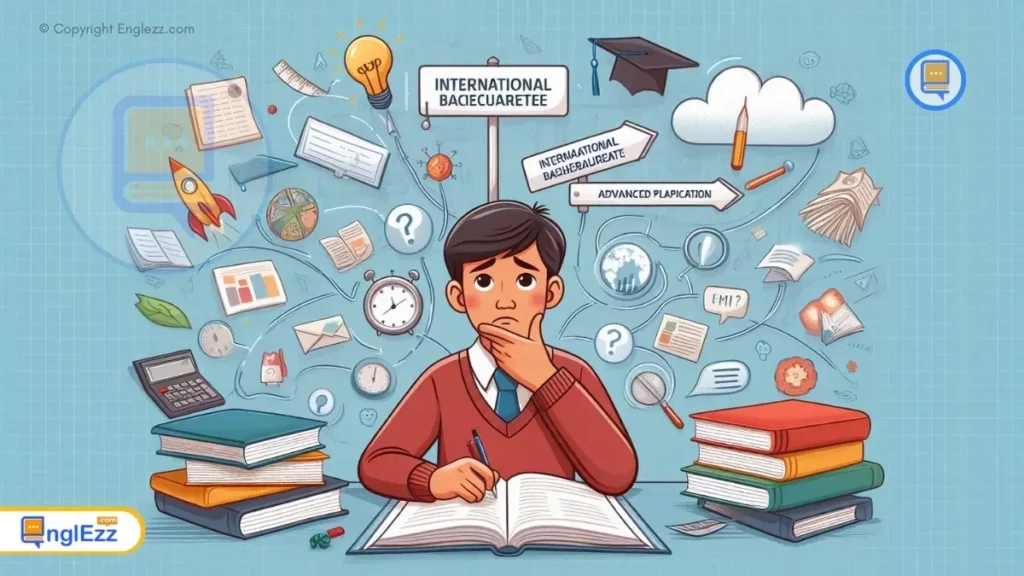In the realm of advanced education, two prestigious programs stand out as beacons of academic excellence: the International Baccalaureate (IB) and Advanced Placement (AP). As high school students, parents, and educators navigate the landscape of educational opportunities, understanding the nuances between IB and AP becomes paramount in unlocking the path to success. These programs not only shape scholastic endeavors but also mold critical thinking skills, global perspectives, and future career aspirations. Embark on a journey with us as we delve into the intricate tapestry of IB and AP schools, unraveling their distinctive characteristics and guiding you towards an informed choice that aligns with your educational ambitions.
International Baccalaureate vs Advanced Placement (IB vs AP): Decoding the Key Differences
Picture a canvas splashed with vibrant hues of rigorous academics, holistic learning experiences, and boundless possibilities – this is what the IB and AP programs offer to aspiring scholars. While both aim to nurture intellectual growth and prepare students for higher education, their methodologies diverge in ways that cater to varied learning styles.

Drawing back the curtain on these educational powerhouses reveals not just curriculum disparities but also contrasting approaches to assessment strategies, fostering a rich tapestry of insights for those embarking on this pivotal decision-making journey. Join us as we explore the hallmarks of IB vs. AP schools intricately woven into the fabric of modern education, each thread representing a unique opportunity for personal growth and intellectual discovery like never before.
Understanding the International Baccalaureate (IB)
The International Baccalaureate (IB) program has gained worldwide acclaim for its rigorous academic framework and emphasis on international education. Established in the 1960s to cater to globally mobile families, the IB program aims to cultivate well-rounded individuals who are equipped to navigate an interconnected world. At the core of the IB philosophy is a commitment to promoting intercultural understanding, open-mindedness, and critical thinking skills among students. By delving deep into diverse subject areas and encouraging reflection on complex global issues, IB schools nurture young minds to become compassionate and informed global citizens.
One distinguishing feature of IB schools is their structured curriculum that emphasizes not only academic excellence but also holistic development. Students engage with a broad range of subjects, including languages, sciences, humanities, mathematics, and the arts, fostering a comprehensive skill set that extends beyond traditional classroom learning. The assessment methods used in IB programs test students’ abilities to think critically, solve problems creatively, communicate effectively, and collaborate with peers from different cultural backgrounds. This multifaceted approach ensures that students emerge not just with knowledge but with the capacity to apply it meaningfully in real-world contexts.
Reflect on your academic strengths, interests, and future aspirations. If you thrive in a challenging and holistic learning environment that encourages critical thinking and international perspectives, IB might be the right fit. On the other hand, if you excel in a specific subject area and seek college credit opportunities, AP courses could be more suitable. For example, if you aspire to study computer science in college but also enjoy exploring global issues, choosing a mix of AP Computer Science A and IB Global Politics can cater to both your passions.
Moreover, IB schools enjoy global recognition for their high standards of education and adherence to principles that transcend national boundaries. Whether a student attends an IB school in New York City or Tokyo, they can expect a consistent quality of education rooted in values like inquiry-based learning, intercultural respect, and ethical responsibility. This universality empowers students with a sense of belonging to a larger community that transcends geographical limitations. By immersing themselves in an environment that celebrates diversity and promotes intellectual curiosity, students in IB schools are well-prepared to tackle complex challenges and contribute positively to a rapidly changing world.
Exploring Advanced Placement (AP) Courses
Advanced Placement (AP) courses have a rich history that dates back to the 1950s when they were introduced to challenge high school students and prepare them for college-level academics. The mission behind AP courses is twofold: to provide students with an opportunity to delve deeper into subjects they are passionate about and to earn college credit through successful performance on AP exams. For example, a student interested in psychology can take an AP Psychology course in high school, which not only enhances their understanding of the subject but also allows them to potentially earn college credit if they perform well on the corresponding exam.

One of the standout features of AP programs is the vast array of subjects offered, ranging from traditional disciplines like Mathematics and English Literature to more specialized areas such as Computer Science and Environmental Science. This diversity enables students to explore various fields of study and tailor their high school experience to align with their academic interests and career aspirations. Moreover, the partnership between AP courses and colleges or universities grants students the opportunity to accelerate their academic journey by earning college credits while still in high school.
In addition to subject variety, flexibility plays a key role in defining AP programs. Students have the freedom to choose which AP courses they wish to enroll in based on their strengths, interests, and future goals. This adaptability allows individuals to personalize their education by selecting coursework that aligns with their ambitions. Despite this flexibility, AP courses are renowned for their academic rigor — challenging students with rigorous assessments, critical thinking tasks, and advanced coursework that mirror the expectations of higher education institutions. This blend of flexibility and challenge equips students with valuable skills such as time management, analytical thinking, and perseverance that are essential for success in college and beyond.
Comparative Analysis: Curriculum and Assessment
When comparing the curriculum frameworks of the International Baccalaureate (IB) and Advanced Placement (AP), one notable distinction lies in their approach to knowledge acquisition. IB emphasizes depth over breadth, encouraging students to delve deeply into a few subjects through its six subject groups. This focus on in-depth exploration allows students to develop a comprehensive understanding of complex topics, fostering critical thinking and analytical skills essential for higher education and beyond. On the other hand, AP courses offer a wide array of subjects, providing students with an opportunity to explore various disciplines intensively but not as comprehensively as IB.
In terms of assessment strategies, both IB and AP use a mix of exams, essays, and external evaluations to gauge student understanding. However, the emphasis on assessments differs between the two programs. While IB assessments often include internally assessed components like essays, presentations, or projects that contribute significantly to final grades, AP assessments primarily rely on standardized exams administered externally. This variation influences how students demonstrate their knowledge and skills within each program’s framework.
The distinct approaches to curriculum depth and assessment methods shape how IB and AP prepare students for higher education pathways differently. IB places a strong emphasis on holistic education by blending academics with creativity, activity, service (CAS), helping students develop as well-rounded individuals ready for global challenges. In contrast, AP’s focus on subject-specific expertise prepares students for rigorous college-level academics by allowing them to specialize in areas of interest while earning potential college credits based on exam performance. Understanding these nuances can assist high school students in choosing a program aligned with their academic goals and aspirations for the future.
Benefits of Choosing an IB School
When it comes to selecting between an International Baccalaureate (IB) school and other academic paths, the unique advantages offered by IB institutions stand out prominently. One of the key benefits is the holistic education approach that IB schools adopt. In these schools, students are encouraged not only to excel academically but also to develop into well-rounded individuals with a deep understanding of global issues and cultures. For instance, at XYZ IB School, students engage in collaborative projects that address real-world challenges, fostering empathy and cultural awareness among them.

Moreover, IB programs are designed to promote interdisciplinary learning. Students don’t just study individual subjects in isolation; instead, they explore connections between various disciplines, helping them see the bigger picture and think critically across different domains. This approach not only enhances their problem-solving abilities but also prepares them for the complexities of our interconnected world. An example of this can be seen at ABC IB School, where students work on projects that integrate science, technology, art, and social sciences to tackle complex societal issues like sustainability or global health disparities.
While the benefits of attending an IB school are profound, it’s essential to address some potential challenges associated with pursuing an IB diploma. The rigorous nature of the program can sometimes lead to high levels of stress among students if proper support systems are not in place. However, many IB schools offer counseling services and extracurricular activities aimed at promoting mental well-being and work-life balance. By acknowledging these challenges upfront and proactively seeking solutions, students can navigate through the demanding but rewarding journey of an IB education successfully.
Advantages of Opting for AP Courses
Choosing to enroll in Advanced Placement (AP) courses can offer high school students a multitude of benefits, including the opportunity to delve deep into subject-specific expertise that aligns with their academic passions. For example, a student passionate about science may opt for AP Biology or AP Chemistry to gain college-level knowledge and skills in these fields even before stepping foot on a university campus. By immersing themselves in these advanced courses, students not only enhance their understanding of various subjects but also demonstrate a commitment to academic excellence that can impress college admissions committees.
Moreover, one distinct advantage of AP courses lies in the potential to accelerate one’s college graduation timeline and save on tuition costs. By earning qualifying scores on AP exams, students can receive college credits that may fulfill certain introductory course requirements at their chosen universities. This means that students have the chance to bypass entry-level classes in college, allowing them to focus on more challenging coursework or even graduate ahead of schedule. As an illustration, a student who earns credit for AP Calculus AB and BC exams may enter college with enough credits to skip prerequisite math courses and proceed directly to upper-level mathematics classes.
Seek advice from current IB or AP students, teachers, counselors, or alumni to gain insights into the day-to-day experiences and outcomes of each program. Attend information sessions held by schools offering these programs to understand their teaching philosophies and support systems. By talking to individuals who have firsthand knowledge of IB and AP, you can better gauge which educational path aligns with your learning style and goals.
Additionally, the diverse range of AP offerings allows students to tailor their high school experiences based on their unique interests and career aspirations. Whether it’s delving into languages, social sciences, arts, or STEM subjects, the flexibility of the AP program empowers students to create a customized curriculum that reflects their individual strengths and preferences. For instance, a student interested in pursuing a career in international relations may opt for AP World History and AP Human Geography to deepen their understanding of global issues and develop critical thinking skills essential for success in this field.
By embracing the advantages of enrolling in AP courses—from specialized subject knowledge and potential cost savings to personalized learning opportunities—students can enhance their academic growth, expand their horizons across various disciplines, and pave the way for future success in higher education and beyond.
Decision-Making Process: Factors to Consider
When making the pivotal decision between International Baccalaureate (IB) and Advanced Placement (AP) programs, high school students, parents, and educators must weigh several crucial factors. Understanding individual learning styles is paramount; while the IB program emphasizes a holistic approach with an international perspective, AP courses offer subject-specific depth. Exploring how students thrive academically can inform this choice – for example, if a student excels in multiple disciplines and enjoys interdisciplinary connections, IB might align better with their learning style. On the other hand, students seeking specialized knowledge in particular subjects may find AP offerings more suitable.
Future ambitions play a significant role in choosing between IB and AP pathways. Students aspiring to study at global universities or pursue careers emphasizing cultural awareness and critical thinking might lean towards IB for its international focus. Conversely, those aiming for specific college majors or looking to earn advanced placement credits could find AP courses better aligned with their goals. It’s essential to align educational choices with long-term aspirations to set a strong foundation for future success.
Considering extracurricular commitments alongside academic pursuits is key in the decision-making process. While both IB and AP are rigorous programs, students involved in extensive extracurricular activities might need to assess how each program fits into their schedules. For instance, if a student is heavily involved in sports or clubs that require significant time commitments, they may benefit from the flexibility of AP courses compared to the comprehensive requirements of an IB curriculum.
Consider your extracurricular commitments, personal well-being, and time management skills when selecting between IB and AP. The rigorous nature of both programs requires dedication and strong organizational abilities. Evaluate whether you prefer focusing deeply on fewer subjects (IB) or covering a broader range of topics (AP). Remember that maintaining a healthy balance between academics and extracurricular activities is crucial for long-term success in high school.
Furthermore, consulting teachers or counselors and visiting schools offering IB and AP programs can provide invaluable insights. These professionals can offer personalized guidance based on a student’s strengths, interests, and career goals. Visiting campuses allows prospective students to experience firsthand the environment and culture of each program, aiding in making an informed choice that aligns with individual preferences and educational objectives. By leveraging such resources and conducting thorough research, students can embark on a path that nurtures their academic growth and personal development effectively.
Making Informed Choices for Educational Success
In navigating the decision between International Baccalaureate (IB) and Advanced Placement (AP) programs, it is crucial for high school students, parents, and educators to carefully consider a variety of factors. Individual learning styles, future aspirations, and academic preferences should all play a role in this pivotal decision-making process.
While IB schools offer a holistic education that emphasizes interdisciplinary learning and international-mindedness, AP courses provide the opportunity to specialize in specific subjects and potentially earn college credits. By researching schools offering these programs, consulting with teachers or counselors, and understanding personal goals and extracurricular commitments, individuals can make informed choices that align with their educational journey.
For instance, if a student is passionate about global issues and seeks a broad educational experience that fosters critical thinking skills on an international scale, the IB program might be an excellent fit. On the other hand, a student aiming to delve deep into specific subjects like calculus or literature to gain expertise in those areas while earning early college credit might lean towards AP courses. By recognizing one’s strengths, interests, and goals alongside considering how each program aligns with these factors, individuals can tailor their high school experience to maximize success in higher education pursuits.
Ultimately, the decision between IB and AP comes down to personal preferences and educational objectives. Each program offers distinct advantages suited to different types of learners. By weighing the curriculum structures, assessment methods, global recognition levels, as well as potential challenges associated with each pathway against individual needs and aspirations—students can make confident decisions that set them up for success both academically and personally. Education is not just about acquiring knowledge; it’s about shaping experiences that resonate throughout one’s life journey—choosing between IB and AP is just one step towards laying a strong foundation for future growth.
Frequently Asked Questions About The Topic:
1. Which is better: IB or AP?
– The answer depends on your individual preferences and goals. IB offers a holistic educational approach while AP provides subject-specific depth.
2. Do colleges prefer IB over AP?
– Colleges appreciate both programs as they demonstrate different strengths in students’ academic profiles.
3. Can I do both IB and AP?
– It is possible but could be challenging due to the demanding nature of both programs.
4. Do IB credits transfer to colleges like AP credits do?
– Yes, many colleges worldwide accept IB credits for advanced placement or credit.
5. How do I decide between IB and AP?
– Consider your interests, learning style, future plans, and school offerings before making a decision.
By carefully weighing these factors – personal alignment with program goals, seeking guidance from experienced individuals, and managing workload effectively – high school students can confidently choose between IB and AP programs based on their unique needs and ambitions.
As you embark on your educational journey, remember that choosing between IB and AP is not about selecting one over the other; rather, it’s about identifying the pathway that aligns best with your aspirations and paves the way for your academic success.
By staying informed, exploring your options thoroughly, seeking advice from mentors or counselors when needed, you are empowered to unlock the doors to a fulfilling educational experience tailored to your unique talents and ambitions. Best wishes as you navigate this exciting chapter of growth and discovery!









Choosing between International Baccalaureate vs Advanced Placement? Learn about the nuances that set these programs apart for your academic success.